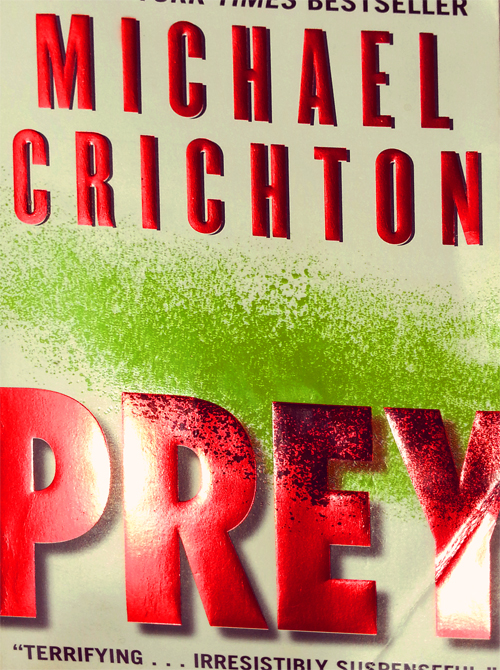I have finished Michael Crichton’s Prey last night. I had picked it up because I wanted to read at least one nanobots sci-fi before they enter our everyday lives. With headlines like “Nanobots Can Now Enter Human Cell With Help Of Sound Waves, Offering Hope For Guided Missile Attacks On Cancer” or “Behold The First Nanobot Assembly Line In Action” this day seems to come closer.

Prey passed pretty low-temperatured on my “can’t stop reading” vs “bath tub water getting colder and colder” test, which means: decently thrilling. What disappointed me though is Crichton’s technophobia. He is clearly fascinated by future technology but his focus always is on a wagging finger: Huminz, thou shalt not play god! Prey shows a strong interest in the technical side of things, in how nanotechnology can work as an interface between biology, chemistry, IT and med technology etc. but it doesn’t have much patience for the technology/human relationship beyond the predatory. The new life form is an enemy bred from Silicon Valley capitalist greed, more like a demon possessing a human than an enriching symbiosis. The stranger stays strange and must be destroyed.
A fear of technology-driven evolution, if not even fear of change creeps through this book.
There is no exploration beyond a technological one. There is zero communication between the swarm with its hive mind and humans. There is only Disneyesque good/bad guys communication with the nanobots who live symbiotic with humans. It’s disappointing because with all the knowledge he gathered you’d think Crichton could have fleshed that part of the story out quite good. If only to make it a more tense decision to crush them bots. Even Mary Shelley let us sympathise with Frankenstein’s monster but Crichton has no pity for the new life form he created. Crichton’s swarm is ultimately evil, as is the hero’s wife from the moment she starts creating it.
She is the mad scientist, working overtime out of passion for her experimental technology, a maybe cheating wife – she always stays ‘his wife’ – , and she gets to play a double-bad-mother role: for the human children she egoistically leaves behind for her job and for the nanobot swarm. Her symbiosis with the nanobots has ever so slight incestuous connotations and so much closeness between an autonomous mother and her offspring can only result in evil and must be killed.
While he is very bothered not to paint his male characters as tough guys Crichton’s depiction of women leaves a bad taste: they are handy helpers (babysitters, house cleaners) or faux-strong women. ‘Faux’ because even if described as tough colleagues they never are really equal or self-reliant, at best they get to contribute to his deeds but ultimately it’s the always-on-the-edge male hero, like Die Hard’s John McLane, who takes control, the self-sacrificing stay-at-home-dad coming back to science only to solve the problems others have caused. I think my name for this kind of heroes from now on will be male-flu guys.
Despite those flaws and read as an action adventure novel: All in all a fun mostly fast-paced read.
If you know of a novel that you think is better nanobots science fiction – please let me know!
